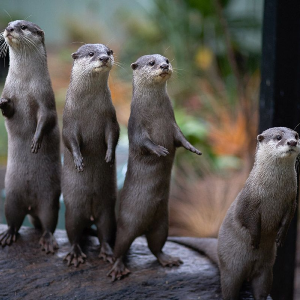
Otters
(n)Otters are the dogs of the water world, so it's no small wonder that we humans have such affection for them.
View moreSo what is it about otters than make them so otterly amazing?
View moreOtters have the densest fur of the animal kingdom.
View moreOtters spend a large amount of time in the water, yet they still have fur.
View moreOtters can be found all over the world.
View moreOtters can be found in unpolluted waters all over the world in marshland, freshwater rivers, lakes, oceans and coastlines.
View moreThere are 13 known species of otters, which range in size from 2.9 feet (90 cm) all the way to 5.9 feet (1.8 m) long!
View moreOtters are expert hunters.
View moreOtters are known to be pretty incredible hunters, living off a diet of mostly seafood.
View moreWhile river otters mostly live off fish, crayfish and crabs, sea otters have a more interesting method of sustaining themselves.
View moreSea otters are known for their remarkable ability to use rocks to smash open shellfish to fill their stomachs.
View moreThe majority of otters spend most of their time on land.
View moreMost species of otters actually spend their time on the banks of rivers and other bodies of water when they're not hunting.
View moreSea otters though, are the complete opposite.
View moreNot all otters eat seafood.
View moreIn a bizarre turn away from their normal diet, there are some otters in the Shetland Islands in Scotland which have been known to hunt rabbits instead of fish.
View moreOtters are very social animals.
View moreOtters are usually found in small family groups with the mother and her young offspring.
View moreDuring mating season, or when there's an abundance of food you will find much larger groups of otters.
View moreOtters are raised by their mothers.
View moreOtters are born with their eyes closed, and as soon as they open they have a lot to learn like swimming and hunting.
View moreOtters and humans sometimes work together.
View moreHistorically otters have been used by humans to aid in the process of fishing all over the world.
View moreNowadays this technique is still practiced in Bangladesh, where trained otters are used to chase fish into fishing nets.
View moreSea otters hold hands when they sleep.
View moreThese otters don't just do this to be incredibly adorable though.
View moreSea otters also hold onto kelp that grows from the floor of the sea for the same purpose.
View moreRiver otters rarely make their own homes.
View moreOtters?
View moreRiver otters are much more likely to take another animal's home instead of building their own.
View moreThere's a surprisingly large amount of names used to describe otters.
View moreWhen otters are born they can either be called pups or kittens.
View moreFemale otters can be called sows or bitches, and male otters can be called boars or dogs.
View moreThere's also no single collective noun for them - if there's a group of otters on the water they are called a raft, but if they're on land they can be called a bevy, family, romp, or lodge!
View moreOtters can hold their breath for a really long time.
View moreOtters, like humans, are mammals.
View moreSea otters can hold their breather underwater for more than 5 minutes, and river otters can hold theirs for more than 8!
View moreOtters eat 15-20 percent of their bodyweight daily.
View moreOtters have to eat vast amounts of food every day, which takes up a significant portion of their time.
View moreIt's key to their survival to eat such great quantities, especially for sea otters, as they use up so much energy keeping themselves warm.
View moreA lot of species of otters were once at risk of becoming extinct due to their highly sought-after fur.
View moreWhile the practice of hunting otters is no longer a common practice, they're still at risk.
View moreOtters survive by hunting, and as such they live in unpolluted waters.
View moreThere are so many cool facts about otters that it's no small wonder they've become a bit of an internet sensation.
View moreDo you know about otters?
View moreOtters are small, playful animals that love swimming.
View moreOtters have long, slim bodies and short legs.
View moreOtters eat fish, crabs, and small animals.
View moreOtters have very thick fur to keep them warm.
View moreOtters are fascinating creatures that live in water and on land.
View moreThere are 13 different species of otters found all over the world.
View moreSea otters have very thick fur to keep them warm in cold water.
View moreDid you know that otters use tools?
View moreOtters have a special pocket in their underarm to hold their favorite rock!
View more